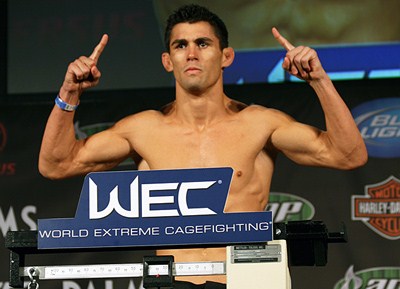
When an action-packed bout goes the distance, it’s pretty standard for some fans to debate how the judges scored the fight. But did the level of dismay over the split decision ruling — which favored WEC bantamweight champ Dominick Cruz — go a little overboard last night?
Former WEC featherweight title-holder Miguel Torres and journalist Ariel Helwani led the charge during the WEC 50 post-fight coverage, debating how any of the rounds could’ve possibly gone to challenger Joseph Benavidez.
Judge Nelson Hamilton, the lone dissenter, gave Benavidez a 48-47, or three rounds to two, edge. Cruz even got in on the action, talking to MMAJunkie after the fight:
“In my humble opinion, I thought I won all the rounds, I thought I won it pretty unanimously. That’s all I can say. I thought I won it.”
To be fair, I had Cruz winning three rounds to two, but I was also glad I hadn’t been given the job of scoring this fight, which certainly highlighted the inherent struggle to score an MMA bout properly. It’s certainly worthwhile to critique judging in a sport that has had more than its fair share of awful decisions — Leonard Garcia’s split decision win over Chan Sung Jung this past April at WEC 48 being a prime example.
However, at the risk of being ridiculed, not only did I have Cruz winning by a round — contrary to his own beliefs and those of Helwani and Torres — but I also couldn’t help but notice that the fight was…I dunno…kinda close.
I’m not usually a big fan of pointing to Compustrike stats, since that doesn’t tell the whole story. Nevertheless, let’s take a look at what the numbers say.
In rounds 1 and 2, Benavidez landed more standing punches (9-4 and 13-10 respectively) and more power strikes (8-4 and 10-8), while Cruz had the leg strikes advantage (10-3 and 5-4).
Let’s not forget, all strikes are not created equal. For those of you who remember Shane Mosely’s two controversial decision wins over Oscar de la Hoya, you’ll recall that Oscar’s fans claim their boy got robbed. I mean, he threw more and landed more!
Shane’s supporters responded by saying, “Shut up, Shane hits harder.” If only MMA were that simple. Some punches hurt more than other punches, some leg kicks hurt more than other leg kicks, some leg kicks hurt more than punches, and vice versa.
And now onto the takedowns. Cruz scored one each in the first two rounds. As I believe Mr. Torres stated, Cruz “stole” the rounds with his takedowns. (By the way, how is a round clear cut if the fighter had to “steal” it by getting a last second takedown?)
Back to my earlier point, not all takedowns are created equal either. We aren’t talking about a powerful double-leg, slam, to side control maneuver. Cruz, more accurately, managed to get Benavidez down and landed a whopping 12 ground strikes in those two rounds.
And we also aren’t talking about the kind of head-knocking, cringe-inducing ground-and-pound we saw à la Carlos Condit vs. Rory MacDonald at UFC 115.
Depending on your vantage point, you could make the case that Benavidez landed the more effective punches (and more of them), Cruz’s leg kicks didn’t do a lot of damage (a replay of Jose Aldo vs. Urijah Faber it wasn’t), and that Cruz didn’t come anywhere near overpowering and hurting Benavidez on the ground, nor did he achieve any dominant positions.
Simply put, getting a quick takedown that lands you in another fighter’s guard and delivering a few run-of-the-mill, close range punches, isn’t necessarily any different from a damage perspective from pushing your opponent against the cage for a moment and throwing short punches and knees.
If you want to disagree with Hamilton, that is certainly your prerogative. But questioning the rationale of scoring a couple of rounds for Benavidez is a bit much.
That being said, don’t take anything away from Cruz. He did his job and got the win, all without letting the seemingly unnecessary fan booing get to him.
No matter, says Cruz. He’ll just keep winning and let the chips fall where they may. And if you think a few boos get to the champ, think again:
“I’m used to it. I’ve been booed since I started. I feed off of it. Bring it. Bring the boos. Of course it would be great to have cheering. That would be nice, but it would be a little too easy, wouldn’t it?”

Cool Story Bro!!!
“Simply put, getting a quick takedown that lands you in another fighter’s guard and delivering a few run-of-the-mill, close range punches, isn’t necessarily any different from a damage perspective from pushing your opponent against the cage for a moment and throwing short punches and knees.”
That IMO is where you go off track. When a fighter gets pushed into a cage he usually has stopped the takedown. So he has kept the fight where he wants it. When a fighter gets taken down he is put in a place that he didn’t decide to be. The other fighter enforced his will, and put the fight in his most advantageous position. When the scores are close in every round(and they were for some part) a takedown at the end of a round should seal that round for that particular fighter.
I had it 49-46, and the only round I scored for Benavidez is the 4th when he landed the best strike of the fight for either fighter(the knee against the cage). IMO the scores should not have been close at all eventhough the fight was damn close…